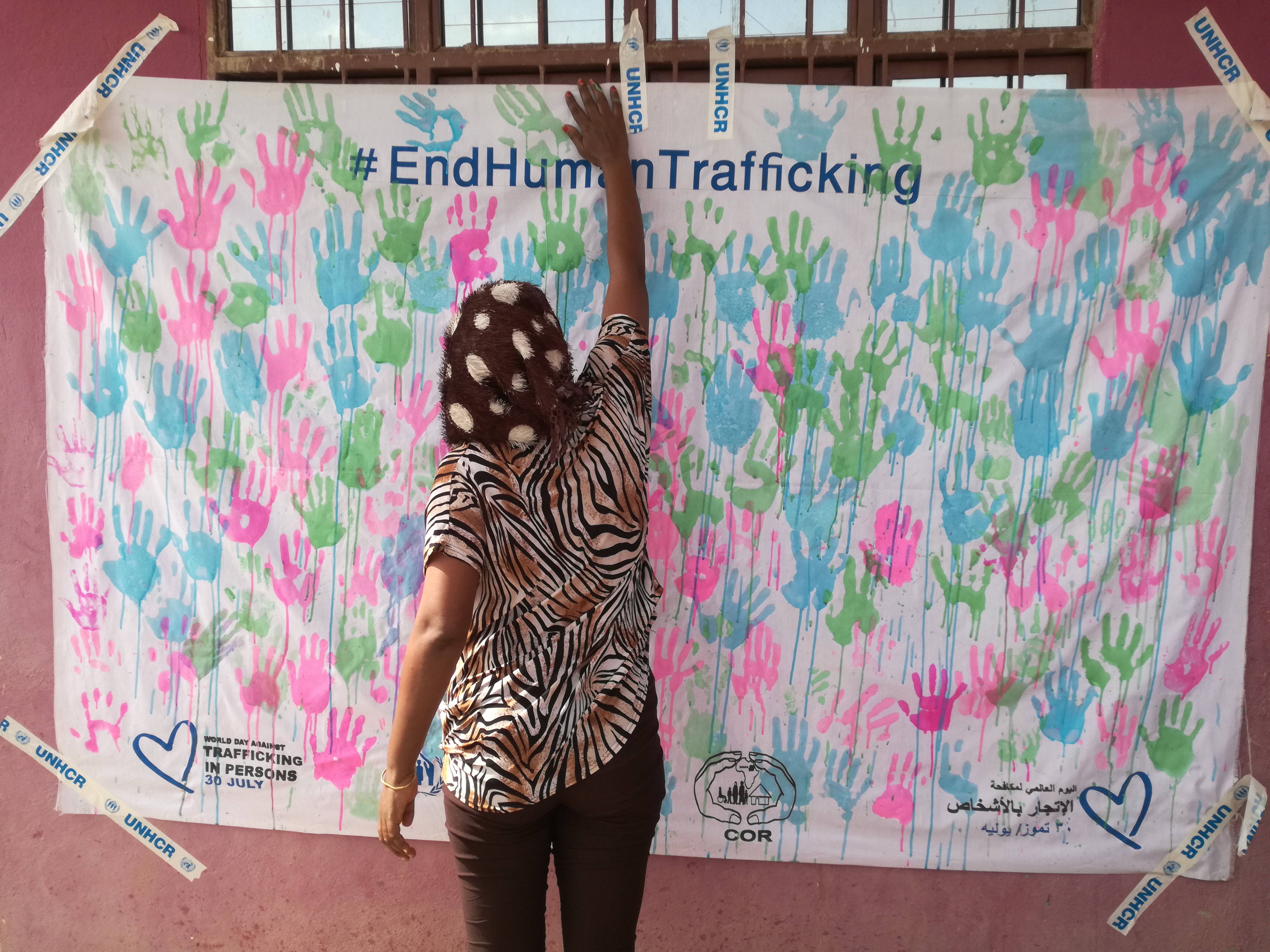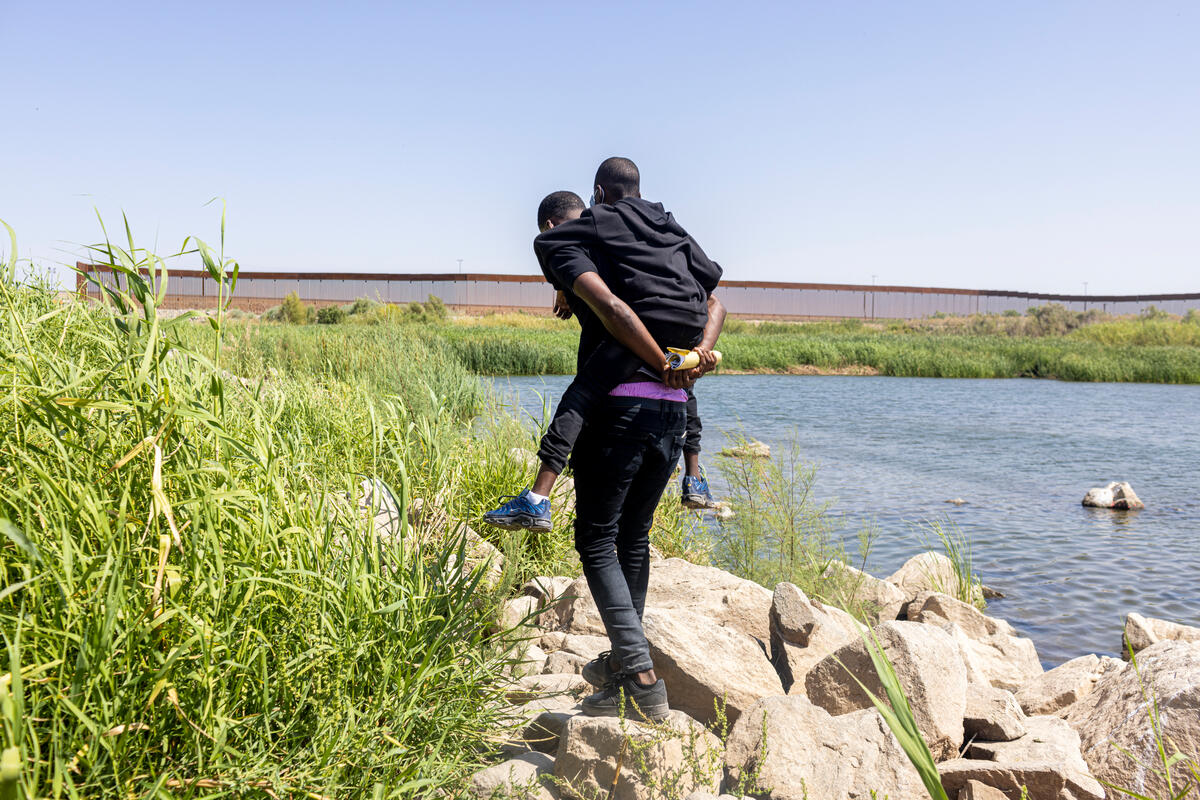Q&A: Protection: The heart and soul of the UN refugee agency
Q&A: Protection: The heart and soul of the UN refugee agency

GENEVA, February 9 (UNHCR) - A lawyer by training, Assistant High Commissioner for Protection Erika Feller joined UNHCR on a short-term assignment in 1986. She stayed on and is now responsible for UNHCR's protection mandate, which she says is the heart and soul of the organisation. Feller sat down recently in Geneva with web editors, Leo Dobbs and Haude Morel. Excerpts of the interview:
What does protection mean for UNHCR?
Protection embraces everything we do - whether it's the delivery of tents, the delivery of food, or whether it's putting in place primary education initiatives for young children, it delivers a protection outcome. It improves the environment that people live in. It contributes to their human dignity, it contributes to the realisation of their rights and their physical security. Protection is a responsibility which impacts everything we do; hence it has to be the driver behind everything we do.
Protection has a number of component parts. Firstly, it's something that we deliver directly in the field. It's an outcome that directly impacts on the well-being and the security of individuals. But it goes beyond that.... It's also an advocacy responsibility. UNHCR was created as an advocate for the rights of particularly vulnerable groups, or individuals. It's also a standard-setting task. There are a lot of instruments out there.... More are being drafted which bear in one way or another on the principles and the protection framework in which we work. Our role is to contribute here and to ensure that these statements ... are not something that takes it [protection] backward.
We also have a capacitating role because states are obviously not only our main partners, but they are also principally responsible for protection delivery. We cannot just bang the table and criticise states for not living up to the responsibilities they have assumed. Our task is also to help them assume and implement, in good faith, those responsibilities.
Who does UNHCR protect?
We protect people of concern to us. But who is of concern to UNHCR? Obviously refugees, but even that's an issue with a number of levels to it. We have a definition of who's a refugee in our Statute and that person is classically defined as a victim of persecution.... However, more people today flee for physical security reasons which are not necessarily related to individual persecution, but more to widespread conflict, civil disorder, internal disturbances ... so-called victims of violence.
We know we have a mandate for these people.... Some states fully agree with us, others accept that we have a responsibility without necessarily seeing that responsibility as also theirs. A very few states contest.
We also have a very important mandate for stateless people.... I mean non-refugee stateless people without an effective nationality, who may be living as habitual residents in the country where they were born or the country where they've been brought up, but don't have any of the attributes of citizenship. They can get themselves into very, very difficult and vulnerable situations.
We are increasingly getting involved with people who are displaced inside their own country ... these are the so-called IDPs, internally displaced people.... We're currently discussing with our Executive Committee what is the scope of our mandate for IDPs, what are the protection implications of our role and how we can prevent our increased activities on behalf of IDPs impacting negatively on our responsibility for refugees.
Another group of persons are refugees who have returned to their countries of origin. Formally speaking, when they are back inside their countries they are no longer refugees, but it does not mean that there are no vulnerabilities for people when they go back.... And so for the period of their reintegration, to a point where they can genuinely be said to have accessed effective national protection, they remain of interest and concern to UNHCR.
There is another category of people for whom we have some responsibility to a certain point in time and these are asylum seekers.... Our role is to ensure that they have proper access to procedures to determine their claim and that until these procedures run their course they're allowed to stay in the country [where they apply for asylum] ... in conditions of dignity and hopefully self-sufficiency.
What challenges does UNHCR face in carrying out its protection work?
One of our key challenges is to preserve access to asylum, and on acceptable conditions, in a world marked increasingly by asylum fatigue. There are a lot of reasons for this. Obviously the global terrorism environment does not help. It's made a lot of countries much more wary about foreigners who arrive at their borders and make a claim to entry. It doesn't help also that many people arrive through less than legal means ... that puts a taint of criminality over asylum arrivals and it wrongly skews in people's mind the definition of refugee.
Another set of problems stem from the fact that many refugee situations don't have immediate, realisable solutions available. They constitute a long-term responsibility, particularly in states not so well situated to assume these responsibilities in the longer term. The longer refugees stay, and in the face of new emergencies, the more the donor community and others turn their attention elsewhere and countries who have been hosting generously for quite a while ... feel abandoned.... They are rethinking their own relationship to refugees and to the refugee populations they host, which for us create protection issues for people who are made more vulnerable because of border closures, refoulements, these sorts of happenings.
Another feature of today's world is a high degree of irregular migration. People are moving for a whole range of reasons. Some of them, perhaps the minority, have a protection concern at their base. But people with protection needs are moving side-by-side with people who are leaving for other reasons. And this mix of asylum and migration has led a number of countries to redefine the whole refugee problem ... to decide that the most appropriate way to deal with it is through migration-related responses which are applied indiscriminately.... Helping states to disentangle refugees.... That's one of our current priorities.
How are you helping countries identify refugees in the mix?
One thing we advocate are proper procedures. It doesn't help to stop people just arriving at borders or turn them round on the high seas ... it's not the way to manage the problem to try and erect barriers, which in themselves only encourage greater criminality.... We try and work with states to put in place such procedures.
We are trying to pioneer something called the 10-point plan, which we hope states will see as a positive contribution by UNHCR to their management of this mixed migration problem. The plan includes procedures to distinguish quite quickly between the different groups and to channel each group into an appropriate response mechanism.... We have a direct interest in seeing this managed in a way which respects the needs and the protection concerns of all people who are moving.
Do you have to compromise with countries over refugee cases?
Some countries have particular sensitivities about particular caseloads - particular groups of people of specific national origin.... Our first responsibility is to the people themselves, if they have protection problems, if they are in need of international protection, our obligation is to galvanise it.
However, we do not work in a vacuum. We are an apolitical organisation, a humanitarian organisation, but we work in a highly politicised environment.... For us to deliver protection, we have to be tactical. This means that we not only have to be aware of the interests that states themselves see impacted by the arrivals of certain groups of people, but we have to be sensitive to them when we decide what is the best way to deliver protection.
How can UNHCR protect IDPs in places like Iraq and Darfur?
I think it's pretty unrealistic to think you can protect civilians in Iraq. I think it's even pretty unrealistic to imagine that UNHCR can fulfil its protection responsibilities in Darfur. I've been to Darfur and the environment is not one where the protection activities that we undertake really make a big impact on the day-to-day security of large numbers of people who are in very insecure environments. That's not to underestimate what our colleagues are doing and under very difficult circumstances. But there are few of us, the area is huge, the conflict is ever changing. The security apparatus that's in place there is not such as to either protect the individuals or to protect the humanitarian workers to enable them to do their job.... It's not a reason not to try, it's not a reason to not continue to do what we're doing. And there are individuals at least who benefit ... that in itself is something.
In Iraq, it's worse to my mind. At least in Darfur we're present, we're not present in Iraq. We're trying to do protection by remote - it's a most unusual concept.... Obviously there are certain things we can do and we have had to very much reorient to strategically partnering, rather than being the deliverer ourselves.
I think because of our realisation that a) it is virtually impossible to do what we would want to do inside Iraq and b) the humanitarian crisis has now spilled over to the neighbouring countries and it is so huge there and there are so many people who are very much in need there, that we have to direct our efforts where they can make the most impact. So we've looked very directly at how we can work with the current host countries, particularly the countries neighbouring Iraq, to assist them to manage the evolving humanitarian crisis.








